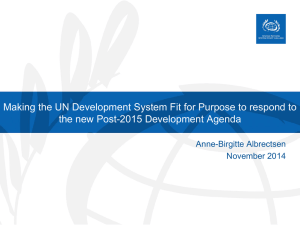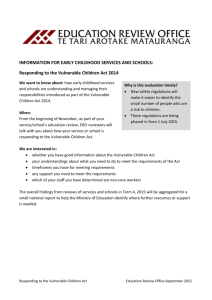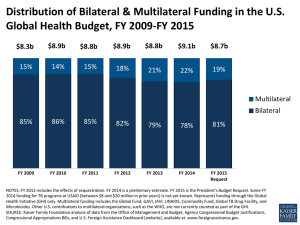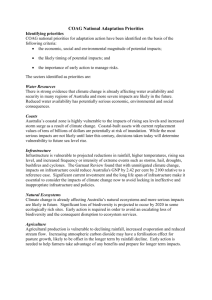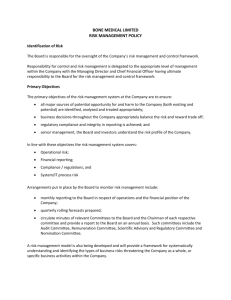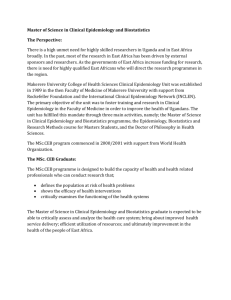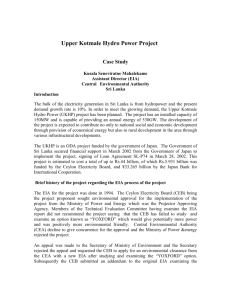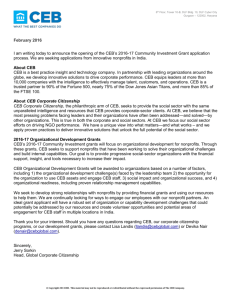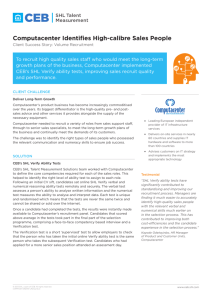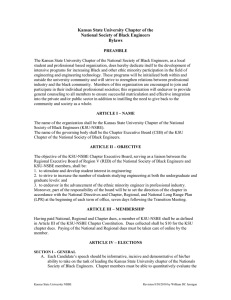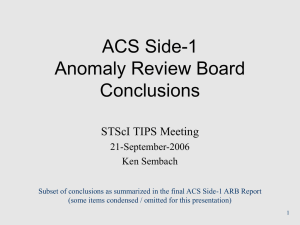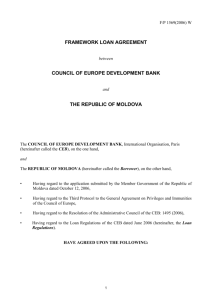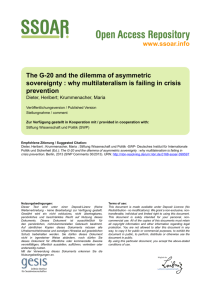DRAFT CEB COMMUNIQUÉ
advertisement
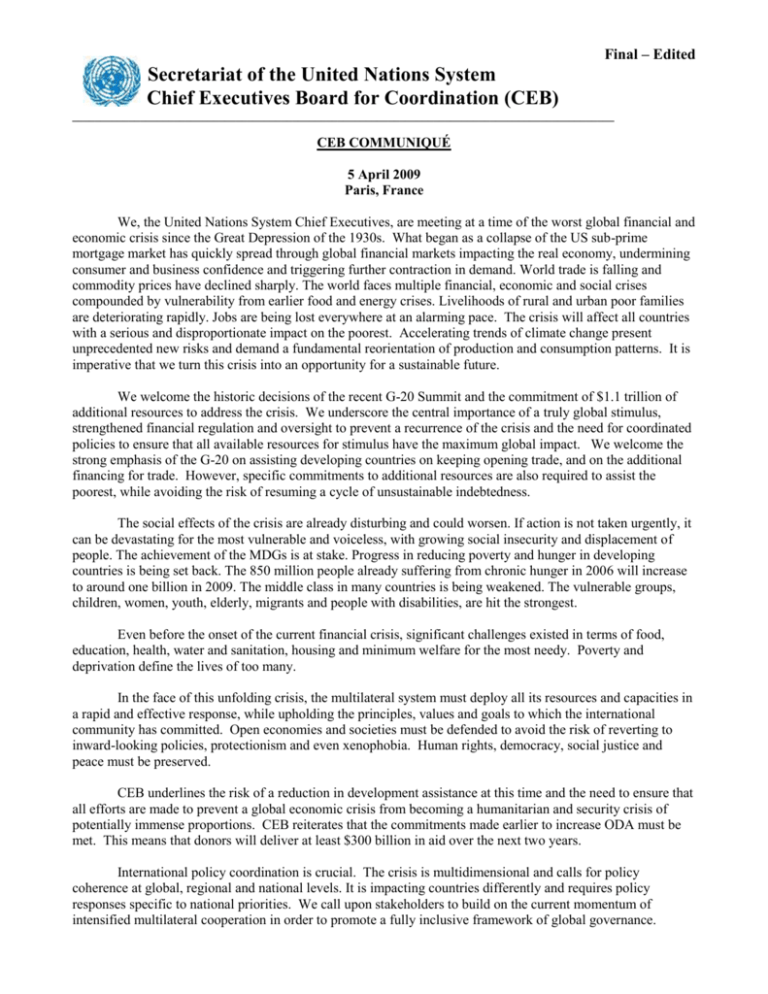
Final – Edited Secretariat of the United Nations System Chief Executives Board for Coordination (CEB) ________________________________________________________________________________________________ CEB COMMUNIQUÉ 5 April 2009 Paris, France We, the United Nations System Chief Executives, are meeting at a time of the worst global financial and economic crisis since the Great Depression of the 1930s. What began as a collapse of the US sub-prime mortgage market has quickly spread through global financial markets impacting the real economy, undermining consumer and business confidence and triggering further contraction in demand. World trade is falling and commodity prices have declined sharply. The world faces multiple financial, economic and social crises compounded by vulnerability from earlier food and energy crises. Livelihoods of rural and urban poor families are deteriorating rapidly. Jobs are being lost everywhere at an alarming pace. The crisis will affect all countries with a serious and disproportionate impact on the poorest. Accelerating trends of climate change present unprecedented new risks and demand a fundamental reorientation of production and consumption patterns. It is imperative that we turn this crisis into an opportunity for a sustainable future. We welcome the historic decisions of the recent G-20 Summit and the commitment of $1.1 trillion of additional resources to address the crisis. We underscore the central importance of a truly global stimulus, strengthened financial regulation and oversight to prevent a recurrence of the crisis and the need for coordinated policies to ensure that all available resources for stimulus have the maximum global impact. We welcome the strong emphasis of the G-20 on assisting developing countries on keeping opening trade, and on the additional financing for trade. However, specific commitments to additional resources are also required to assist the poorest, while avoiding the risk of resuming a cycle of unsustainable indebtedness. The social effects of the crisis are already disturbing and could worsen. If action is not taken urgently, it can be devastating for the most vulnerable and voiceless, with growing social insecurity and displacement of people. The achievement of the MDGs is at stake. Progress in reducing poverty and hunger in developing countries is being set back. The 850 million people already suffering from chronic hunger in 2006 will increase to around one billion in 2009. The middle class in many countries is being weakened. The vulnerable groups, children, women, youth, elderly, migrants and people with disabilities, are hit the strongest. Even before the onset of the current financial crisis, significant challenges existed in terms of food, education, health, water and sanitation, housing and minimum welfare for the most needy. Poverty and deprivation define the lives of too many. In the face of this unfolding crisis, the multilateral system must deploy all its resources and capacities in a rapid and effective response, while upholding the principles, values and goals to which the international community has committed. Open economies and societies must be defended to avoid the risk of reverting to inward-looking policies, protectionism and even xenophobia. Human rights, democracy, social justice and peace must be preserved. CEB underlines the risk of a reduction in development assistance at this time and the need to ensure that all efforts are made to prevent a global economic crisis from becoming a humanitarian and security crisis of potentially immense proportions. CEB reiterates that the commitments made earlier to increase ODA must be met. This means that donors will deliver at least $300 billion in aid over the next two years. International policy coordination is crucial. The crisis is multidimensional and calls for policy coherence at global, regional and national levels. It is impacting countries differently and requires policy responses specific to national priorities. We call upon stakeholders to build on the current momentum of intensified multilateral cooperation in order to promote a fully inclusive framework of global governance. Final – Edited Secretariat of the United Nations System Chief Executives Board for Coordination (CEB) ________________________________________________________________________________________________ The capacity of governments to design, afford and implement the right policies, while coordinating them with international partners, must be strengthened. The multilateral system plays a central role in articulating and delivering a global and coherent response to the crisis, and in translating it into action at the country level. At the country level, United Nations and IMF/WB representatives should work together in a joint and complementary approach to the crisis. We, the United Nations System Chief Executives, are determined to take decisive and urgent action. In view of the multiple facets of the crisis and our collective mandates and responsibilities, we have agreed on nine joint initiatives. This common commitment is designed to assist countries and the global community to confront the crisis, accelerate recovery and build a fair and inclusive globalization allowing for sustainable economic, social and environmental development for all, while facing the future in a spirit of conviction of the need for transformational change: 1. Additional financing for the most vulnerable: advocating and devising a joint World Bank - UN system mechanism for the common articulation and implementation of additional financing, including through the World Bank proposed Vulnerability Fund. 2. Food Security: strengthening programmes to feed the hungry and expanding support to farmers in developing countries. 3. Trade: fighting protectionism, including through the conclusion of the Doha round and strengthening aid for trade initiatives and finance for trade. 4. A Green Economy Initiative: promoting investment in long-term environmental sustainability and putting the world on a climate-friendly path. 5. A Global Jobs Pact: boosting employment, production, investment and aggregate demand, and promoting decent work for all. 6. A Social Protection Floor: ensuring access to basic social services, shelter, and empowerment and protection of the poor and vulnerable. 7. Humanitarian, Security and Social Stability: Emergency action to protect lives and livelihoods, meeting hunger and humanitarian needs, protecting displaced people and shoring up security and social stability. 8. Technology and Innovation: developing technological infrastructure to facilitate the promotion and access to innovation. 9. Monitoring and Analysis: strengthening macroeconomic and financial surveillance and implementing an effective economic early warning system; Urgently establish a UN system-wide vulnerability monitoring and alert mechanism to track developments, and report on the political, economic, social and environmental dimensions of the crisis. Policy coherence and coordination are essential. Promoting coordination of strengthened financial oversight and of economic stimulus packages will enhance their overall effectiveness; and providing relevant policy advice on countercyclical policies will contribute to protecting people, accelerating the way out of this crisis and preventing its recurrence. ____________

